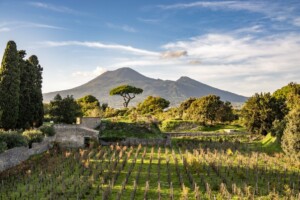
From “Premio alla Carriera” - “Lifetime Achievement Award” to Graziano Prà, of the Venetian winery Prà, who helped shape the history of Soave (among the founders of Fivi, Federazione Italiana dei Vignaioli Indipendent - Italian Federation of Independent Winegrowers, and one of the first to use screw caps), to “Giovane Vignaiolo” - “Young Winegrower” Pilar Gritti, who runs the family winery Andrea Pilar in Umbria with her brother Andrea Gritti; from “Novità dell’anno” - “Innovation of the Year”, the Fiano produced by Bruno De Conciliis in his winery located in the unique setting of Morigerati, in the Cilento and Vallo di Diano National Park, to the best “Accoglienza in cantina” - “Winery Hospitality,” offered by Isabella Carpineti at Marco Carpineti, who, together with her brother Paolo Carpineti, has turned Tenuta Antoniana and the town of Cori in Lazio into a wine tourism destination; from “Premio per la Viticoltura Sostenibile” - “Sustainable Viticulture Award” to Ferdinando Principiano, who practices agriculture respectful of a unique agricultural landscape and its biodiversity, unesco heritage like the Langhe with his winery in Monforte d’Alba, to that of “Vitalità del Suolo” - “Soil Vitality Award” given to Andrea Dibenedetto , who runs the Apulian winery L’Archetipo in Castellaneta, using synergistic agriculture; and finally, “Premio Slow Wine Coalition alla Solidarietà” - “Slow Wine Coalition Solidarity Award” to Marco Bechini of the Calafata winery in Lucca, a community-based agricultural cooperative which restores neglected land and gives dignity back to vulnerable individuals, much like the “calafati” masters once sealed the hulls of boats to make them seaworthy again. These are the “Special Awards” of “Slow Wine” 2026, the edition No. 16 of Slow Food guide to good, clean, and fair wines, which recently featured a major tasting event at Superstudio Maxi in Milan, open to wine lovers, in a unique event of its kind in Italy where visitors could meet winemakers from all over the country and discover over 900 wines and more than 450 wineries - 242 were awarded with “Chiocciole” - “Snails” for good, clean, and fair wineries, 188 received “Bottiglie” - “Bottles” for wines with excellent organoleptic quality, 49 earned “Monete” - “Coins” for outstanding value for money, and 133 were “new entries” which were not reviewed in the previous edition of the guide - all arising from the principles of the “Manifesto del vino buono, pulito e giusto” - “Manifesto for Good, Clean, and Fair Wine”.
The event also represented an occasion for discussing on the future of Italian wine and its environmental, economic, and social value of this world. In a context marked by climate crises, nearby wars, youth disengagement, and global economic tensions, Giancarlo Gariglio, editor of Slow Wine, urges the wine world not to give up but to “react with indignation and courage: the two forces which, quoting Saint Augustine, give concrete form to hope”. The editor reflects on the importance of telling “wine’s uniqueness with authenticity and transparency”, emphasizing the need to “urgently address three key areas to overcome the current challenges facing the sector. The first concerns production: it is essential to act on replanting, uprooting, and regulations, eliminating outdated rules which favor quantity over quality, enforcing existing laws, and ensuring proper oversight. We must reduce yields, block the indiscriminate expansion of vineyard areas, and combat speculative practices that harm the sector. The second aspect involves the structure of cooperatives, which produce about 50% of Italian wine. A deep reform is needed to encourage mergers among small entities, invest in professional skills and expertise, and move beyond the often still approximate management, so they can compete in the global market. Finally, the third crucial point is promotion and marketing: today, there is a lack of a coordinated strategy which unites efforts at national and regional levels with targeted investments in quality training and communication. Overcoming fragmentation and truly enhancing our food and wine culture internationally is fundamental. Only by tackling these three areas together we can overcome the current crisis and ensure a solid, sustainable, and excellent future for Italian wine”.
Finally, one of the main innovations of the 2026 edition of the guide - 7,972 reviewed wines and 1,172 wineries which practice certified organic/biodynamic agriculture or are in conversion, and, among the awards, also 153 “Best Buys”, a selection of “Top Wine” with advantageous pricing, 196 “Bere Slow” - “Slow Drinking” venues, 439 wineries offering hospitality, and 294 with dining options, but also 845 wineries offering a 10% discount on wine purchases - is the inclusion of bottle glass weight, information now listed for all reviewed wines - of these, 3,023 wines come in bottles weighing 450 grams or less - helping guide readers toward more sustainable choices, not just regarding the wine itself, about which we already talked, today, in Milan, during the sustainable packaging panel “Il futuro è leggero. Ridurre il peso, aumentare l’impatto positivo” - “The future is light. Reduce weight, increase positive impact”. A choice which is coherent with the path initiated in the last “Slow Wine Fair”, the great event dedicated to “vino secondo Slow Wine” - “wine according to Slow Wine”, held at BolognaFiere with “Sana Food”, from February, 22nd to 24th, 2026 - with the guide “Unpacking Wine”, which spotlighted the importance of packaging and its environmental impact. In particular, Slow Wine is launching a “call to action” for still wines, inviting producers to reduce the average weight of 0.75-liter bottles to under 450 grams by the end of 2026.
Copyright © 2000/2026
Contatti: info@winenews.it
Seguici anche su Twitter: @WineNewsIt
Seguici anche su Facebook: @winenewsit
Questo articolo è tratto dall'archivio di WineNews - Tutti i diritti riservati - Copyright © 2000/2026